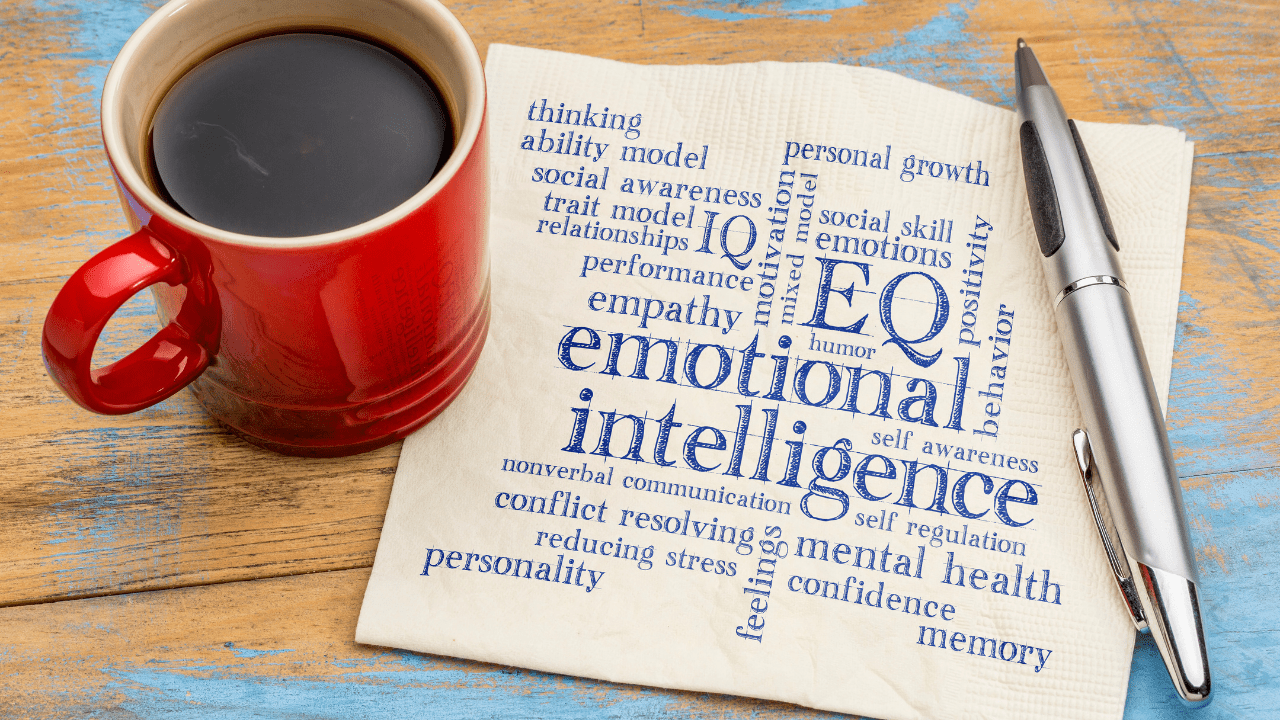Learning how to improve emotional intelligence at work will change your performance and instill a sense of peace. See how.

It takes something more than intelligence to act intelligently.
– Fyodor Dostoyevsky
Whether it’s at work or in our personal lives, we all know that one person who excels at active listening, stress management, collaboration, and putting out those pesky perpetual ‘fires’ for the benefit of all.
Let’s define emotional intelligence first
Emotional Intelligence (EI or EQ) is the ability to effectively recognize, understand and manage your own effectively, along with being able to manage the emotions of others in real-world settings. Wow. Right there we can see that this is no easy task. Not only must you master yourself, but you must also master communication, interpersonal skills, and people — on your feet and perhaps in the ‘heat of the moment.’
It takes a lot of training and practice to do this. The reason is that no amount of hypothetical scenarios can mimic the myriad of complexities at play when communication breaks down into conflict or confrontation. Ideally, everyone would be able to avoid the conflict. But when deadlines are tight, the stakes are high, our fight or flight stress response is on overdrive. In those moments, only those with a high emotional intelligence can take calm, considerate action.
This is what makes emotional intelligence such a highly valued and sought after skillset in the corporate world.
When end-stage deliverables require teamwork, effective management, or client interface — emotional intelligence becomes the cornerstone of every product and relationship. EQ will showcase who really are (both positive and negative traits), directly impact our performance and wellbeing, and affect all those we interact with daily.
It’s clear that we can’t over emphasize the importance of EQ. In today’s corporate world, intelligence quotient (IQ) or academic performance is just not enough to be highly successful. While IQ is still an important factor, more hiring practices are gauging EQ levels and rewarding high emotional intelligence with more opportunities.
We can further define emotional intelligence as consisting of four key behavioral patterns. Those with a high EQ will have and utilize a broad set of skills in each of these categories: (1) Self-Management; (2) Self-Awareness; (3) Social Awareness; and (4) Relationship Management. Luckily no matter what your baseline is today, you can take definitive steps to finesse your EQ abilities. Read on for our key steps and practice these to reap professional and personal benefits.
How to increase your emotional intelligence: Your 4 steps
For clarity and ease, we used the behavioral patterns described above, which are commonly attributed to a high EQ, as the backbone of our 4-step guide.
Increase Emotional Intelligence Step 1: Build Up Your Self-Awareness Tools and Practices
This isn’t easy. We can spend a lifetime learning about ourselves, getting in touch with our thoughts, emotions, and feelings.
Building an arsenal of self-awareness tools is critical if you’re going to go it alone. I created a whole methodology to help my clients do this. It takes five weeks to learn because we go layer by layer into the mind using neuroscience, psychology, and step-by-step modern day mindfulness.

The reason I created a system is because I saw countless professionals struggle with it. Organizing and understanding the complexities of the mind and our own behavior are enough to make anyones head spin (which ironically adds chaos instead of helping us). Yet, identifying this is essential because we can’t make space for the great stuff (ideas, creativity, passions, dreams) if we don’t sort past/existing thoughts, habits, and deeper workings of our conscious and subconscious minds.
Remember, on top of identifying your thought and emotional triggers, you need to see what your programmed reactivity is. These are your pain points. Be honest with yourself about where you are without any judgement. You need to be as neutral as possible to move the needle in the right direction.
As often as you can but at least 3x a day, do a ‘self- check-in.’ You can start by asking yourself these three questions:
-
How do I feel right now?
-
Do things feel easy or difficult now?
-
Am I more likely to smile or frown and what’s the reason behind it?
This may feel silly at first, but realize that you’re giving yourself and your brain valuable feedback. As you become consciously aware of yourself, it will become easier to intervene and reshape your patterns.
You can add to your toolkit by engaging in activities that boost self awareness such as yoga or a martial art. These will also help you with the next step.
Increase Emotional Intelligence Step 2: Implement a Variety of Self-Regulation Techniques
What does it mean to self-regulate? It means to put a pause between the triggers or pain points we’ve identified and our reaction. This is another one of those things that’s easier said than done. The reason for this is how we’ve reacted in the past encodes our present moment reactivity.
Part of my methodology in my neuroperformance course is about cultivating this ‘space’ between action and reaction, then learning to redirect. We need time for messages to reach higher brain regions so that we can use reason, logic, even goodwill and common sense to shape our actions.
When pressure and stress take over, it becomes difficult for us to think clearly and be present in the moment. Instead, we’re in states that harken us back to some past similar instance and before you know it, you’ve responded the same way again.
It’s so hard for us to stop and self-regulate because it’s unnatural during times of true stress. Consider if you were being chased by a predator, would calm self-regulation or heightened reactivity be more optimal? The latter, of course. But since predators are a rarity in the corporate world, other triggers have overtaken our primal instants.
Practice meditation, breathing, tai-chi, yoga, or anything else that slows down the rush of feelings. The better you get at acting, the less you’ll react. With time, you’ll get better at managing the changing circumstances and controlling whatever impulse would propel you into reactivity.
Increase Emotional Intelligence Step #3: Practice Reading Social Awareness Cues Daily
Social awareness means identifying and interpreting how others feel, through verbal and non-verbal cues. This is a critical interpersonal skill both your professional and personal life. Consider how much better off you might be if you could mind-read what others thought every time you spoke or interacted with them?
While mind reading isn’t something we can do, there are people who’ve made an art out of reading others. Some use it for magic or illusion, other use it to make sales, and still others use it to date or score points with the opposite sex.
An easy place to start is to make it an intentional practice to notice the expressions, words, and other cues others display after you say or do something. Perhaps you’re saying the right words but something about your nonverbal communication suggests you’re not really open to collaborating. The only way you’ll improve is by first observing.
The art of effective communication is all about a two-way street. So none of us can truly excel at it if we don’t stop to assess the impact of our communication. This widely expands to all forms of communication — not just words. Maybe what you didn’t say or your body language had a larger impact than your words.
From building relationships to conflict management, social awareness skills help you communicate better without negative outcomes. Your expressions, tone of voice and body language are all critical factors that contribute to positive social interactions. Becoming masterful at reading social awareness cues, will also help you manage and influence other people’s emotions in productive, positive ways.
Increase Emotional Intelligence Step 4: Use Levity, Humor, and Lightness Authentically
In charged or potentially stressful situations, humor and laughter are natural antidotes to conflict. They can play a crucial role to calm you and the other people around you down. But it’s important not to use humor to avoid the problem or ignore someone else’s feelings or input.
Most people have an ingrained authenticity detector. They can tell when you’ve used a joke or anecdote as a momentary pause to diffuse a situation, or when you’re doing it inauthentically to make light of something they value.
Some people naturally have the right balance on when to use humor and when to avoid it. The rest of us might need some practice, and will make mistakes, but this is a worthwhile tactic to hone. The reason is straightforward — we all want to be around people that are fun, funny, and know how to make us feel good.
But remember, while humor is great to blow out the fuse — disagreements also don’t have to be roadblocks in relationships. Effective relationship management means you also constructively resolve conflict. This actually helps you strengthen bonds and build trust.
Benefits of Emotional Intelligence in the Workplace
Building your EQ levels is a way to change your behavior for the best, in a way that can withstand pressure and stress. It is all about being present and emotionally aware of yourself and the people around you. Developing your emotional intelligence is crucial to create a professional success story. This is your chance to get ahead and standout as a super star leader and team player. Modern HR statistics all confirm that people with high emotional intelligence in the workplace are valuable because:
- They are the most useful and diverse team members.
- They help boost the morale of the workplace.
- They are open to feedback and are self-aware of their strengths and weaknesses.
- They know how to handle a high-pressure scenario and tough conversations.
CREATING MOMENTUM WITH PRACTICE
Emotional intelligence will help you better manage your stress, build relationships, make effective decisions, and even enjoy your daily life. A perfect blend of both IQ and EQ is key to become successful.
Like every other valuable skill, you can boost your EQ with practice. As you take time to implement the roadmap above, you will skyrocket your ability to be self-aware, self-regulate, read social cues, and manage relationships.
Remember, right there is the key to making it all work. Your implementation — your action. Once you get going, you’ll feel no desire to turn back. Once emotional intelligence becomes your strength, the benefits are unlimited.
Next steps to consider
Experience the extraordinary with our groundbreaking neuroperformance programs. Over the course of just 12 weeks, witness a remarkable transformation that permeates every facet of your life: career, daily performance, health, wellness, cognitive function, habits, relationships, energy, and personal and spiritual growth. What sets us apart is our unwavering focus on the brain as the ultimate catalyst for change.
Unleash your full potential as we guide you through a journey of learning, self-discovery, and profound metamorphosis into your highest self. To witness the magic firsthand, explore our home-page brimming with captivating videos that promise to inspire and revolutionize your life. Take the first step today and embark on the path to unlocking your true potential. Explore our programs now.
Join our Alive Mindful Optimist Newsletter
Receive our Modern Day Stress Warrior Series & Mindfulness handouts as our gift to you.
